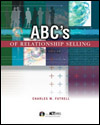The 21st-century business world will unquestionably be a dynamic
and changing place. The rapid growth in technology, the globalization of business,
and increasing competition make sales and relationship skills more important
than ever. In the seventh edition of ABC's of Relationship Selling, my goal is
to give students the information they need to compete in the 21st century. This
edition has been updated to include more role-plays and experiential and www
exercises, more information about the technology available to every salesperson,
and most importantly, the ABC's of relationship selling. ABC's is written by a salesperson turned teacher. For eight
years I worked in sales with Colgate, Upjohn, and Ayerst. As an academic, I
have taught selling to thousands of college students, businesspeople, and industry
sales personnel, developing and using the strategies, practices, and techniques
presented in this textbook. Moreover, each year I continue to spend time in
field work with sales personnel. In my classes and programs, I stress "learning
by doing" examples and exercises and videotape role-playing of selling
situations. This book is the result of these experiences. When students ask me why I moved out of sales, I always
reply, "I really haven't. I'm just selling a different product in a different
industry." We are all selling, whether it's a product, an idea, our parents,
a friend, or ourselves—as when interviewing for a job. ABC's Approach ABC's was conceived as a method of providing ample materials for readers
to construct their own sales presentations after studying the text. This gives
the instructor the flexibility of focusing on the "how-to-sell"
approach within the classroom. Covering the basic foundations for understanding
the concepts and practices of selling in a practical, straightforward, and
readable manner, it provides students with a guide to use in preparing sales
presentations and role-playing exercises.
The Philosophy behind This Text The title should help you understand the philosophy of this book. A student
of sales should understand the ABC's—the basics—of personal selling. All of
them. I do not advocate one way of selling as the best route to success! There
are many roads to reaching one's goals. I do feel a salesperson should have an assortment of selling skills and
should be very knowledgeable, even an expert, in the field. Based on the situation
faced, the salesperson determines the appropriate actions to take for a particular
prospect or customer. No matter what situation is faced, however, the basic
fundamentals of selling can be applied. There is no place in our society for high-pressure, manipulative selling.
The salesperson is a problem-solver, a helper, and an advisor to the customer.
If the customer has no need, the salesperson should accept that and move on
to help another person or firm. If the customer has a need, however, the salesperson
should and must go for the sale. All successful salespeople I know feel that
once they determine that the customer is going to buy someone's product—and
that their product will satisfy that customer's needs—it is their job to muster
all their energy, skill, and know-how to make that sale. That is what it's
all about! It is my sincere hope that after the reader has studied this book, he
or she will say, "There's a lot more to selling than I ever imagined."
I hope many people will feel that this material can help them earn a living
and that selling is a great occupation and career. At the end of the course, I hope all the students will have learned how
to prepare and give a sales presentation by visually, verbally, and nonverbally
communicating their message. I know of no other marketing course whose class
project is so challenging and where so much learning takes place. Finally, I hope each student realizes that these new communication skills
can be applied to all aspects of life. Once learned and internalized, selling
skills can help a person be a better communicator throughout life.
Basic Organization of the Text The publisher and I worked hard to ensure that ABC's of Relationship Selling would
provide students with the basic foundation—the fundamentals—for understanding
all major aspects of selling. The 14 chapters in the text are divided into
four parts: - Selling as a Profession. Emphasizes the career, rewards, and duties of
the professional salesperson and illustrates the importance of the sales
function to the organization's success. It also examines the social, ethical,
and legal issues in selling.
- Preparation for Relationship Selling. Presents the background information
that salespeople use to develop their sales presentations.
- The Relationship Selling Process. At the heart of the text, this part
covers the entire selling process from prospecting to follow-up. State-of-the-art
selling strategies, practices, and techniques are presented in a "how-to"
fashion.
- Time and Territory Management: Keys to Success. The importance of
the proper use of managing one's time and sales territory is given thorough
coverage.
|




 2002 McGraw-Hill Higher Education
2002 McGraw-Hill Higher Education


 2002 McGraw-Hill Higher Education
2002 McGraw-Hill Higher Education